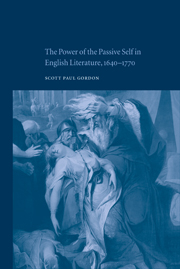Book contents
- Frontmatter
- Contents
- Acknowledgments
- Introduction. “Spring and Motive of our Actions”: disinterest and self-interest
- 1 “Acted by Another”: agency and action in early modern England
- 2 “The belief of the people”: Thomas Hobbes and the battle over the heroic
- 3 “For want of some heedfull Eye”: Mr. Spectator and the power of spectacle
- 4 “For its own sake”: virtue and agency in early eighteenth-century England
- 5 “Not perform'd at all”: managing Garrick's body in eighteenth-century England
- 6 “I wrote my Heart”: Richardson's Clarissa and the tactics of sentiment
- Epilogue: “A sign of so noble a passion”: the politics of disinterested selves
- Notes
- Bibliography
- Index
1 - “Acted by Another”: agency and action in early modern England
Published online by Cambridge University Press: 22 September 2009
- Frontmatter
- Contents
- Acknowledgments
- Introduction. “Spring and Motive of our Actions”: disinterest and self-interest
- 1 “Acted by Another”: agency and action in early modern England
- 2 “The belief of the people”: Thomas Hobbes and the battle over the heroic
- 3 “For want of some heedfull Eye”: Mr. Spectator and the power of spectacle
- 4 “For its own sake”: virtue and agency in early eighteenth-century England
- 5 “Not perform'd at all”: managing Garrick's body in eighteenth-century England
- 6 “I wrote my Heart”: Richardson's Clarissa and the tactics of sentiment
- Epilogue: “A sign of so noble a passion”: the politics of disinterested selves
- Notes
- Bibliography
- Index
Summary
Discussions of agency and autonomy, terms too infrequently distinguished, often share a common assumption: to be the agent of another, rather than a self-determining subject, is an undesirable, anxiety-ridden, and disempowered position. One locus classicus for this assumption is the “Epilogue” to Renaissance Self-Fashioning (1980), which describes an odd plane trip in which Stephen Greenblatt, asked to mouth the words “I want to die,” suddenly realizes his reluctance to “perform lines that were not my own, that violated my sense of my own desires.” This incident reminds Greenblatt of the early modern texts he has been studying: expecting to find that Renaissance “middle-class and aristocratic males” felt that “they possessed … shaping power over their lives,” he discovered instead that in these texts “the human subject itself began to seem remarkably unfree.” This incident led Greenblatt to recognize “this power and the freedom that it implied as an important element in my own sense of myself.” Indeed, in his concluding sentence, Greenblatt confesses his “overwhelming need to sustain the illusion that I am the principal maker of my own identity.” Greenblatt's discomfort at being written by another mirrors the assumption in recent discourse that every loss of self-possession brings a corresponding anxiety or alienation. To be fashioned produces anxiety.
For the writers discussed in this study, however, autonomy or self-sufficiency is the undesirable (and perhaps heretical) position.
- Type
- Chapter
- Information
- Publisher: Cambridge University PressPrint publication year: 2002



